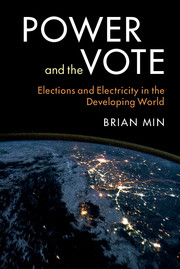Book contents
- Frontmatter
- Dedication
- Contents
- List of Figures
- List of Tables
- Acknowledgments
- 1 Introduction
- 2 Public Goods, Elections, and the Poor
- 3 Power and the State
- 4 Measuring Electricity from Space
- 5 Democracy and Light
- 6 Lighting the Poor
- 7 Electrifying India
- 8 Conclusion
- Appendix Satellite-Derived Estimates of Electrification
- References
- Index
2 - Public Goods, Elections, and the Poor
Published online by Cambridge University Press: 05 November 2015
- Frontmatter
- Dedication
- Contents
- List of Figures
- List of Tables
- Acknowledgments
- 1 Introduction
- 2 Public Goods, Elections, and the Poor
- 3 Power and the State
- 4 Measuring Electricity from Space
- 5 Democracy and Light
- 6 Lighting the Poor
- 7 Electrifying India
- 8 Conclusion
- Appendix Satellite-Derived Estimates of Electrification
- References
- Index
Summary
The legitimate object of government is to do for a community of people whatever they need to have done, but cannot do at all or cannot so well do, for themselves, in their separate, and individual capacities.
Abraham Lincoln, 1854Introduction
Long before Paul Samuelson formalized the economic theory of public goods in the 1950s, Abraham Lincoln recognized that many of society's most critical needs would go unprovided by individuals left to their own devices. President Lincoln argued that it was government's role to supply “all which, in its nature, and without wrong, requires combined action, as public roads and highways, public schools, charities, pauperism, orphanage, estates of the deceased, and the machinery of government itself.”
Even well intentioned and highly motivated groups of individuals will find it a struggle to provide public goods. Theories of collective action show that when the benefits of such services are broad, the incentives for individuals to contribute to their costs are low (Olson 1965). As group size increases, the aggregate costs of provision scale up just as the individual impetus to contribute scales down. Free-riding problems in an open market undermine the incentive to engage in voluntary collective action to create infrastructure and provide basic public services. Thus societies look to their governments to help resolve the collective action obstacles that impede public goods provision. As Olson (1965) puts it, “the state is first of all an organization that provides public goods for its members, the citizens” (15). When governments do a good job of providing public goods, they gain legitimacy, while helping their countries grow and prosper. Yet, the degree of success with which states deliver public goods varies dramatically around the world. Why do some governments produce ample public goods and services while others struggle to do so? Does democracy increase the will of states to supply public goods? And after public goods are promised, how are they distributed, and who actually benefits? Although these are important questions for any citizen, they are life-defining concerns for the poor, for whom access to basic public services can mean the difference between well-being and despair. The better off can afford other solutions, but the poor often have no choice but to depend on governments for access to electricity, clean water, roads, education, and medical care.
- Type
- Chapter
- Information
- Power and the VoteElections and Electricity in the Developing World, pp. 14 - 35Publisher: Cambridge University PressPrint publication year: 2015



